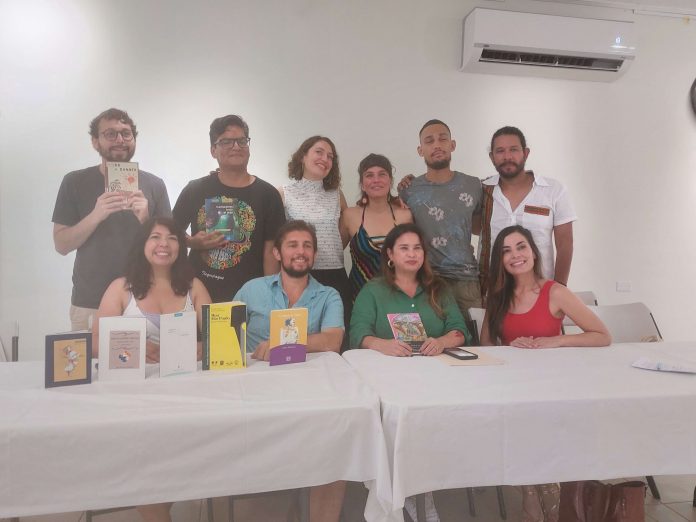(Oranjestad)—The Aruba International Poetry Encounter began last Tuesday, May 9th; a project organized by Maria Silva-Hart from the Basha Foundation, along with Aruban-Argentine poet, Arturo Desimone, and which took place for the first time in Aruba. The event ends on May 18th and is filled with all sorts of activities, meetings, presentation and workshops on the art of poetry and literature.
Our reporter had the opportunity to sit down with some of the poets invited to this meeting to talk about their careers, their history within the poetry world and their expectations for this event.
America Merino, poet and translator from Viña del Mar in Chile, shared that she translates poetry pieces from Italian to Spanish. She studied translation in Florence, Italy, and from there she kept reading, learning and translating.
From a young age, Merino always liked poetry. In elementary school, she always looked forward to the poetry sessions and the end of the year, but it wasn’t until after she left school and went on to university that she took poetry seriously and tried it professionally.
“When I joined the foundation of Pablo Nerudo, I took a workshop with the director. From there, I started developing and perfecting my skills little by little in the field of poetry. I got recommended by poets and writers from Chile, as well as from other countries, and through this I learned even faster,” she stated.
In terms of her stay in Aruba—her first time on the island, Merina said that she is enthralled by the beauty of the island: “It really is a happy island, it’s so beautiful. I don’t think there anything like this back in Chile and everything surprises me; from the intense bright color of the sky to the super friendly people and the great food. I’m always meeting a lot of poets from around the world.”
In terms of her expectations of this event and what she hopes to get out of it, she remarked that she hopes she could shares poetry, have the space to share her work as well as others’ work, especially those she translated: “I want to bring poetry from Chile here,” she expressed.
Marta Jazming Garcia is an artist from Puerto Rico who performed in different areas in the world of poetry and literature. Garcia shared that she mainly writes poetry, but she is also an academic in literature.
She is also an illustrator. She explained that she will soon be releasing her first illustration book: “I’d say my first passion was painting, but I like art in general,” she said.
She further explained how she always liked painting; that was her forte, and then followed writing. Her mom made handmade art crafts from home, and she also had a lot of book to read: “despite our financial struggle, the element of art was never missing at home. That was what kept fueling my passion,” she expressed.
In terms of her expectations of this event, Garcia remarked that this event gave her confidence and opened her eyes to the art of poetry writing and how this really must be shared and discussed amongst artists.
“To be completely honest, writing is a very solitary activity, and I normally don’t share in groups something that I feel is very personal to me. This event reminds you that writing is a social process, that you even have a duty to share your work. And really, I came to learn more,” she said.
Wilson Alves Bezerras is a poet, teacher and translator from Brazil, who during the last 20 years, has dedicated himself to education and the translation of Hispano-American literature in Brazil. He was has a poetry novel and it’s his first time on Aruba.
“Aruba is fascinating because of its linguistics; you see traces of Portuguese, which is my mother tongue. Papiamento is a fascinating language with traces of Spanish, Portuguese, Dutch and English, and for us from all the way in Brazil, it’s very interesting. The island is also very beautiful, the people are really friendly and I’m really enjoying my time here,” he expressed.
Alves-Bezerras shared that he loved children’s stories from a young age and the idea that you can create a story with language and poetry. He has been an avid reader from childhood; his father owned a newspaper kiosk and he would learn words from playing the puzzles that were in these papers.
“University was nothing else than a way to maintain my childhood dreams and my relationship with literature and poetry,” he added.
In terms of his expectations of the event, he explained that he finds the event fascinating, because this way he can exchange poetry with Caribbean and Latin-American poets, which is one of the only ways to keep poetry alive, he expressed.
“Unfortunately, poetry circulates poorly within the continent and meeting other poets is a singular possibility for us to make our work known, translated and edited,” he finalized.




















